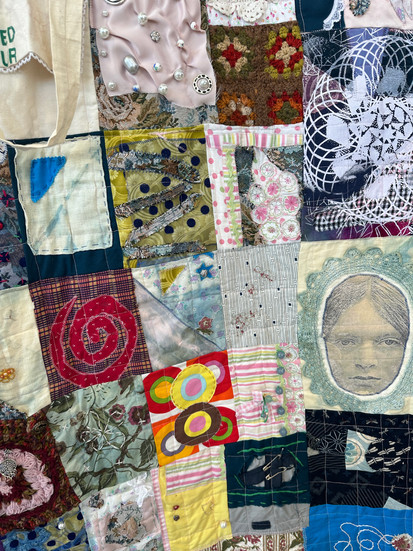An Experiential Journey on Australian Land – Towards Decolonising Fashion and Cultural Reconciliation with First Nations Peoples
- Dr. Francesco Mazzarella
- Jan 9
- 5 min read
In this blog post, I reflect on my recent research trip to Melbourne (Naarm) in Australia in October-November 2024, as a Visiting Researcher at RMIT University, thanks to funding from London College of Fashion (LCF) and support from the University of the Arts London (UAL) International Partnerships team. A long-time inspiration for this trip has been the work of Associate Professor Yoko Akama, strongly committed to cultural sensitivity in her participatory design practice with diverse Indigenous communities aimed at bringing about social change in response to climate disasters and other ‘wicked problems’. Thanks to all the threads of opportunities and connections skilfully woven by Yoko, I was welcomed by Jenny Underwood (Associate Dean of Research and Innovation) in the School of Fashion and Textiles and the wider RMIT community. During my short stay in Melbourne, I was also welcomed by Professor Sarah Pink as a Visiting Researcher at the Emerging Technologies Lab at Monash University, which enabled me to reconnect with former UAL colleague Professor Mel Dodd, and meet new people, such as members of the Indigenous research lab and the Shared Campus programme.
In this post, I discuss findings from my ethnographic research, participation in the Practice Research Symposium, collaboration on several projects (e.g. the Planetary Civics Inquiry) conducted ‘here’ (at RMIT University), facilitation of workshops (such as this), and interviews with key academics and practitioners. Here, I attempt to question and unpack the process of decolonising dominant design practice in the Australian context, and suggest ways to foster social change, cultural sustainability and a regenerative future, through collaboration, creativity, and responsible practice research.
Inspired by a workshop facilitated by Associate Professor Jessica Wilkison, I went through all the notes taken during my research trip, to distil key concepts and words, and turn them into a piece of creative writing, which you can read below. I hope you will enjoy getting an insight into my experiential journey ‘on Country’, a term used to refer to living in a landscape with cultural origins and responsibilities, which ‘Always Was, Always Will Be, Aboriginal Land’. I acknowledge the sovereignty of First Nations, Aboriginal and Torres Strait Islander Peoples – traditional custodians of Australian Land. I draw on my personal experience of the place (including a deep connection to nature, as well as the effects of urban regeneration plans) and my understanding of the negative impacts of local policies (such as the 2023 Australian Indigenous Voice referendum) alongside positive steps I have witnessed towards ‘cultural reconciliation’ and ‘Closing the Gap’ between Australian and Aboriginal and Torres Strait Islander Peoples.
‘On Country’
I’ve embarked on a journey. An experiential journey, healing, inspiring, transformative. A discovery of a Country with sublime landscapes, with endangered and protected wildlife. What is this place like? It takes me a while to understand it. But, once I embrace a very different concept of space and time, I realise how pleasant it is to live here. Australians say that nature is their heritage – wildlife is their language.
In this colonised place, gates keep moving. It’s about thresholds and belonging – to be longing.
Decolonising or indigenising? In this post-colonial nation, where missions have caused forced displacement, we experience a loss of identity, lack of memorials, banned souvenirs, lost hope after the 2023 Australian Indigenous Voice referendum. And yet, Aboriginal art is reclaiming its space in contemporary design. A collision of worlds? Reconciliation? Acknowledgement of Country – of sovereignty.
We must go back, before we go forward. We must undo colonial legacies and structural disadvantages. It all starts from us. We must decolonise ourselves – unlearn – open up to uncertainty. We must recognise our privilege, unintended exploitation, power imbalances. We need to create allies with First Nations. We should look outside and listen to what’s always been here. We go to places, in search of deeper meaning – like the eagle, with an eye to the past, one to the future, and keeping the direction into the present. We listen to stories – collective stories. We centre local wisdom – embodied wisdom. It’s about truth telling.
There is no sustainability without decoloniality. Sustainability is cultural. We must honour cultures – the pluriverse. Culture is the binder between humans and nature. We must go beyond technocratic approaches to sustainability. We need to advocate for a paradigm shift – spirituality must be at the centre of sustainability discourse and action.
The dominant design system is stuck. So, how to re-orient the designer role? What to bring? What to take? What to create? We have a responsibility. What legacy shall we leave behind? We must rethink design education. We need to create spaces – to connect people – to shape decentralised systems. We must care for ourselves, and for others. It’s an act of radical generosity. We build trust – care – kinship – relationality with Country. Country guides you, holds you. It’s an emotional investment. It takes time. There is a lot of invisible emotional labour, to create conviviality. We need to be invited. We turn to the Elders – community leaders – to follow cultural protocols, to practise rituals of hospitality.
In this journey on Country, I discover new ways of being – ways of doing – ways of making. I’m struck by the quality of PRS – a Practice Research Symposium about radical experimentation – articulated with lots of confidence. Through sensory practices, embodied criticality, creative care, cross-cultural exchange – the future is woven here...
I invite you to unlock your potential as a design change-maker. Too reflect on your values – to acknowledge your positionality – to reframe challenges as opportunities for change – in yourself and in the system.
What’s this Planetary Civics Inquiry? It’s about shifting the ‘overton window’. It’s a focus on planetary stewardship and governance – a lens on the ecology of place – on a whole living system and its entanglements. We gather a community of practice to shape a Theory of Change. The Fashion and Textiles Studio is a catalyst for alternative approaches – grounded in provocation, participation, speculation. A space for asking critical questions – for moving with urgency, while recasting and seeding new projects – towards long-term change.
Here, responsible practice and indigenous knowledge shape Regenerative Futures. What is this new initiative? A place for experimentation – on design pedagogy – through responsible practice – towards regenerative design cultures. Let it emerge from the cracks. Beyond institutionalisation and traditional structures?
Here, we focus on curriculum architecture. We nurture, showcase, and celebrate fashion enterprises and sustainable innovations. I’m struck by this radical creativity, craftsmanship, diverse cultural heritages. We shape future careers. Enabling platforms are enablers of social change. How to create impact at scale? We envisage a professional-in-residence programme – grounded in trans-disciplinary – values-aligned partnerships – and co-creation for social change.
I’m also invited into the world of Emerging Technologies. Through a Design Anthropology lens, we focus on encounters – on the locale – on the mundane. What’s concept? I engage in critical assemblages – design and making processes. I make my own assemblage of photographic memories – with paper – voids. Selections, layering and subtractions of memories. I embrace uncertainty. It’s an act of sensemaking – through collective interactions.
In this Shared Campus, we focus on place-making – investigating extractivism and critical ecology. Since bushfires affect disadvantaged communities in rural areas, research shapes sustainable transitions towards climate adaptation and disaster resilience. Top-down management systems are not working. Instead, we create spaces for mentoring communities – for creating social capital – self-organisation – upskilling. Participatory action research drives local initiatives – supplementing policy change.
And the journey continues… on Country, and away from Country. I’m committed to treasure and retain forever this newly acquired energy and mindset… What’s next, for this new me – as a researcher, practitioner, activist, and human being?
If you are interested in finding out more about my design journey towards social change, come and attend my talk with PhD researcher Victoria Ho, as part of LCF Sampled x Research, taking place at London College of Fashion (LCF), East Bank, on 12th February 2025 from 6pm to 8pm. I look forward to further exchanges then...

































Коментарі